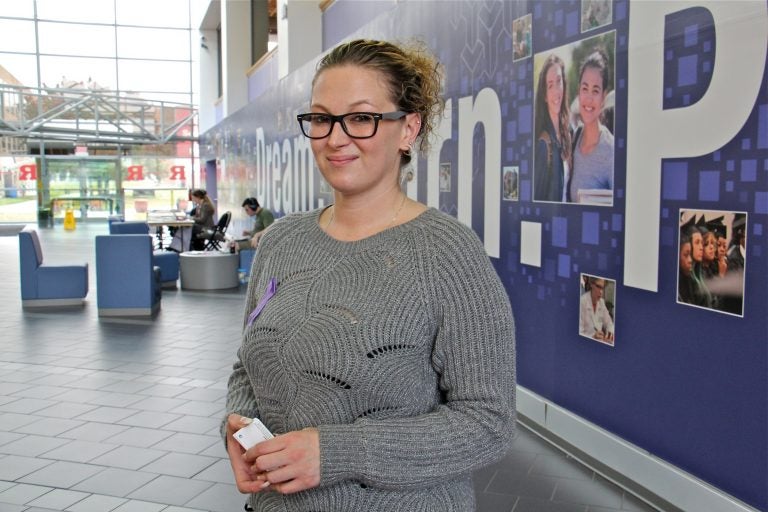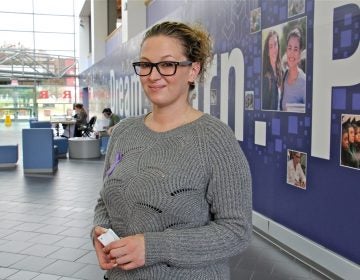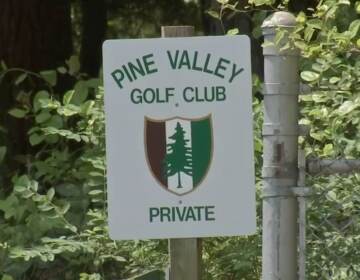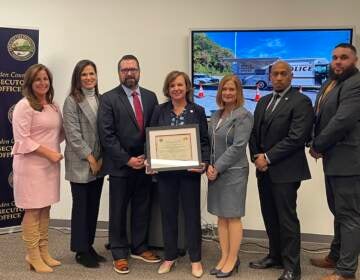How Camden County municipal courts are turning around addiction stories
"The last place I thought that I was going to get help was a courtroom," one woman said.

After going through addiction treatment, Felisha Buzard is a student at Camden County College and looks forward to regaining custody of her 2-year-old daughter. (Emma Lee/WHYY)
Charged with her third DUI and addicted to heroin, Felisha Buzard showed up to Pennsauken municipal court in April feeling “morally bankrupt.”
Before her case was called, however, she was approached by a substance use clinician who offered to intervene with the judge and get her into treatment.
“She came up to me, she explained the program, and she asked me if I would like help,” Buzard recalled. “And she got me an assessment right there and then in the courtroom.”
The seemingly chance encounter was actually part of the Camden County-based Project SAVE, one of the latest attempts by New Jersey officials to combat an addiction crisis that has already claimed more than 2,100 lives this year across the state.
Now in all but three of the county’s municipal courts, Project SAVE has connected more than 200 non-violent drug offenders with treatment since January, said coordinator Colleen Snow.
Based on those numbers, Camden County officials announced Wednesday they would extend the program for another three years at a cost of roughly $350,000 a year. The program thus far has been running as a pilot modeled on an initiative first implemented in Gloucester Township in 2014.
Buzard spoke at a news conference on Wednesday announcing the extension. She said Snow, who also served as her personal counselor, provided her an option other than going to jail, possibly without treatment, or dying of an overdose.
“To have somebody speak on your behalf and say, you know, we’re going to get this person help, they have an addiction issue, and actually stick to their work and follow you through it — you don’t get that,” she said.
The 31-year-old Cherry Hill resident is now five months sober, pursuing a degree in peer counseling and is slated to regain custody of her two-year-old daughter this weekend.
“Project SAVE saved my life,” she said.
That program is just one of several intervention initiatives state and local officials have launched to combat an opioid scourge that has touched every corner of New Jersey and the country.
So-called drug courts, which help people overcome addiction while resolving related charges, have existed at the Superior Court level since the 1990s and were made mandatory for certain defendants in 2012 under former Gov. Chris Christie.
Under Operation Helping Hand, overseen by the Attorney General’s Office and now in all 21 counties, law enforcement officers help connect drug users with addiction services.
In the original model, launched in Bergen County in 2016, police would arrest people purchasing heroin and then connect them with addiction specialists at the police station. Since then, counties have tweaked the program. Burlington County, for example, sends a recovery coach to meet with people who receive emergency medical care for an overdose.
Last month, the Attorney General’s Office also announced the creation of “Opioid Response Teams” in Camden, Trenton, Newark, Paterson and Toms River to provide around-the-clock intervention services.
Despite those efforts, overdose deaths in New Jersey have remained stubbornly high. Such deaths skyrocketed from 1,223 in 2012 to an estimated 3,118 last year, according to state data.
Overdose deaths this year are also high by historical standards but there have been about 150 fewer deaths compared to the same period in 2018.
WHYY is your source for fact-based, in-depth journalism and information. As a nonprofit organization, we rely on financial support from readers like you. Please give today.





